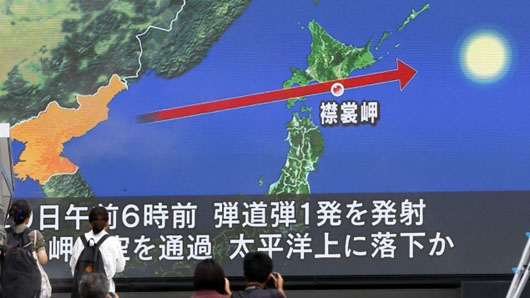by WorldTribune Staff, August 29, 2017
Residents of Japan’s Hokkaido, a northern island of 5.5 million, awoke early on Aug. 29 to a “J-Alert” on their mobile phones from the government, warning that North Korea had fired a missile and to take shelter.
At 5:58 a.m., the Kim Jong-Un regime launched the North’s first ballistic missile to fly over Japan since 2009, and it was headed toward Japan’s northernmost main island, Reuters reported.

Hokkaido resident Ai Onodera said she was asleep when an alarm on her phone went off at 6:02 a.m.: “Missile launch. Missile launch. North Korea appears to have fired a missile. Take refuge in a solid building or underground,” the alert read, Onodera said.
By 6:07 a.m. the missile – traveling at close to 12,000 km/hour (7,500 miles per hour) and at a maximum altitude of 550 kilometers (340 miles) – had flown across the island and out to sea.
Within three minutes of the launch, Prime Minister Shinzo Abe had ordered Japanese officials to gather and analyze incoming information. The alerts went out one minute later.
Pyongyang’s latest missile launch not only frayed the nerves of millions of Japanese, it also rattled Asian stock markets.
Japan’s Topix index closed 0.2 percent lower after falling as much as 0.7 percent, while South Korea’s Kospi index lost 0.2 percent, paring a drop of as much as 1.6 percent. The S&P/ASX 200 Index in Sydney declined 0.7 percent. Hong Kong’s Hang Seng Index fell 0.4 percent, while the Shanghai Composite Index fluctuated before edging higher.
U.S. President Donald Trump responded to the missile launch by saying “all options are on the table.”
“The world has received North Korea’s latest message loud and clear: this regime has signaled its contempt for its neighbors, for all members of the United Nations, and for minimum standards of acceptable international behavior,” Trump said in a statement.
“Threatening and destabilizing actions only increase the North Korean regime’s isolation in the region and among all nations of the world. All options are on the table,” he added.
Abe called the missile an unprecedented, serious and grave threat to Japan, adding that he would ask the United Nations to up the pressure on Pyongyang.
Nikki Haley, U.S. ambassador to the UN, said the U.S., Japan and South Korea have called for an emergency meeting of the organization’s Security Council.
Haley said “something serious has to happen,” adding, “enough is enough.”
At 6:06 a.m. on Aug. 29, minutes after Japan set out the “J-Alert,” the North Korean missile entered the air space over Hokkaido, according to government bulletins released soon after.
At 6:12 a.m., some 14 minutes after it was launched near the North Korean capital of Pyongyang, the missile fell into the Pacific Ocean some 1,180 kilometers (735 miles) east of Hokkaido’s Cape Erimo.
The alert from the government’s Fire and Disaster Management Agency saying the missile had passed over Hokkaido was sent two minutes later.
Japanese residents who spoke to Reuters relayed a feeling a helplessness.
“We felt helpless knowing there was nothing we could do even while a missile was passing through the skies of Japan,” said Hiroaki Kumasaka, 38, who works at a publishing company and was at Tokyo Station for a business trip up north.
“I sent a message to my family saying that ‘Japan is no longer safe,’ and the stranger standing next to me shared the same sentiments with me,” he said.
Andrew Kaz, a 24-year-old American working as an assistant language teacher in the eastern Hokkaido city of Kushiro told Reuters he was worried about the potential response from Japan and the United States.
“I know this happened before but I feel small and rudderless,” Kaz said. “Everything seems like business as usual, but you can tell people are shaken up.”
In recent weeks, North Korea has launched a series of missiles toward Japan, but most of them fell into the Sea of Japan to the west of the country.
Several coastal towns on Japan’s main island of Honshu have held missile drills after the North’s recent missile tests. Hokkaido officials said they were planning what appeared to be its first such drill on Sept. 1.
Subscribe to Geostrategy-Direct __________ Support Free Press Foundation
